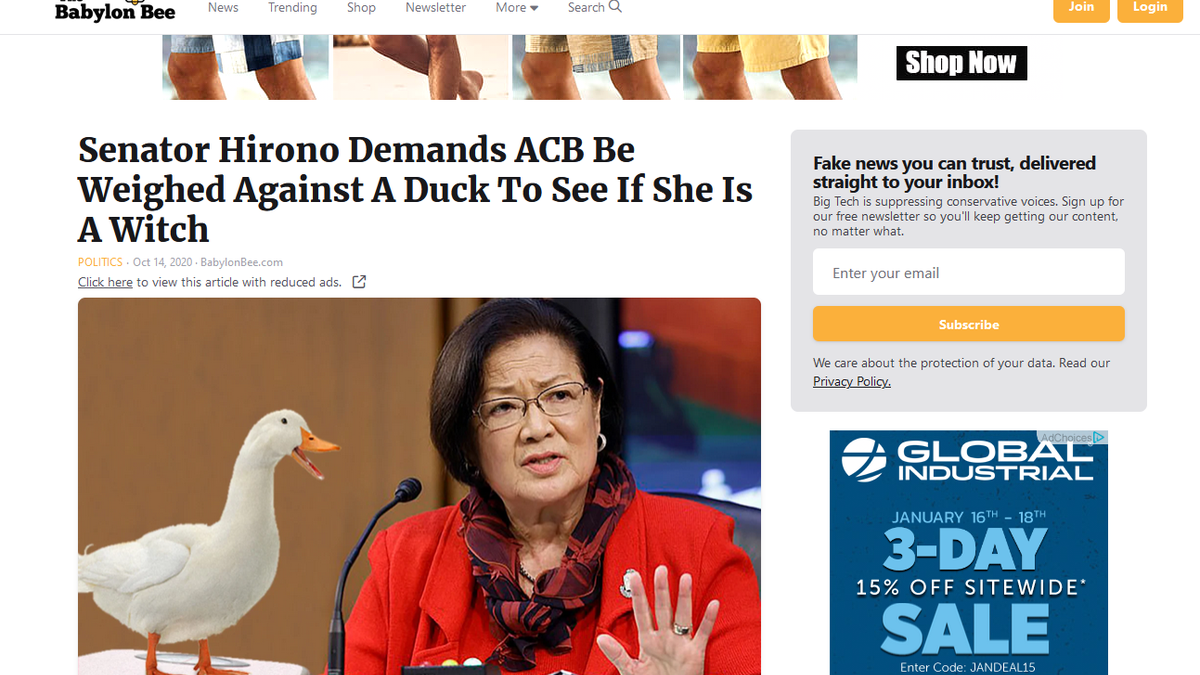Fox News Flash top headlines for February 16
Fox News Flash top headlines are here. Check out what's clicking on Foxnews.com.
On February 28, the Supreme Court will hear arguments in two cases involving state laws in Texas and Florida that increase transparency and accountability for Big Tech companies. The laws would require social media giants to publish their user standards and then apply them fairly.
The Babylon Bee filed a friend of the court (amicus) brief to explain to the court that, when left to their own devices, Big Tech often abuses these vague policies to silence voices that challenge its orthodoxy — too often at the expense of conservative and religious viewpoints.
Social media titans seem to have unlimited, unilateral authority to censor, deplatform or shadow-ban disfavored users, content and viewpoints. The companies claim to be "content-neutral" and "open platforms," and they reserve the right to censor content that violates their "community guidelines" and rules against "hate" and "misinformation."
IRANIAN AYATOLLAH REMOVED FROM FACEBOOK, INSTAGRAM OVER HAMAS SUPPORT
Examples abound:

Babylon Bee CEO Seth Dillon urges the Supreme Court to make social media companies stop using vague policies to censor conservatives and Christians. (Modified Fox News Digital/Joseph Wulfsohn)
In 2022, Twitter suspended The Babylon Bee’s account for ‘hateful conduct’ after it named Assistant Secretary for Health Dr. Rachel Levine the site’s "Man of the Year." Twitter refused to reinstate The Bee unless it deleted the tweet, something The Bee refused to do on principle. Had Elon Musk not bought Twitter, The Bee would almost certainly still be banned.
Humorless Facebook employees read The Bee’s satire piece during Justice Amy Coney Barrett’s confirmation hearing — titled "Senator Hirono Demands ACB Be Weighed Against a Duck to See If She Is a Witch." Facebook quickly decided the article "incited violence" and refused to change its position.
A few months ago, YouTube flagged The Bee as a "violent criminal organization" because it questioned censorship (apparently failing to see the irony). YouTube removed its video "If the LEAKED Nashville Shooter Manifesto is legit, what does it say about censorship in the US?" Even after appealing this mischaracterization of the video’s content, YouTube held firm.
But this isn’t just The Bee’s problem. Far from it.
Big-Tech-driven censorship also impacts religious Americans whose faith animates traditional views on many topics of intense political debate. Social media has repeatedly kicked organizations off their platforms for supporting traditional marriage, opposing abortion and questioning transgenderism.
In the past few years, faith-based and pro-life organizations were deplatformed at a nearly weekly rate.
In 2018, Facebook temporarily suspended Pastor Franklin Graham for "hate speech" and "dehumanizing language" because of an old comment on North Carolina’s bathroom law, where Graham said we "need to go back! Back to God. Back to respecting and honoring his commands." Facebook apologized only after immense backlash.
In 2020, Facebook, Instagram and Twitter all censored praise and worship videos posted by Bethel Music’s Sean Feucht, claiming his videos violated "community guidelines."

Facebook censored this Babylon Bee satire piece.
The same year, YouTube temporarily booted theologian John Piper’s audiobook, "Coronavirus and Christ," for "violating community guidelines."
Social media has also clamped down on pro-life ads from Susan B. Anthony List, Heartbeat International, Live Action, Students for Life, and even pro-life senatorial candidates, all while allowing Planned Parenthood’s pro-abortion political ads without question.
This egregious, one-sided censorship is why we argued in our brief that the Supreme Court should allow states to hold Big Tech to its own rules and provide fair platforms.
The corporations respond that these state laws violate their First Amendment rights to exercise editorial judgment over content on their sites. This misses the point.
CLICK HERE FOR MORE FOX NEWS OPINION
Americans rely on social media to share their views, increasingly more than they do by any other means. Your telephone company and the post office can’t filter which messages are permissible based on their opinion of what you said. The same rules should apply online.
Social media is the modern-day public square. Even if they are private companies, Big Tech giants should not have discretion to ideologically decide who can speak online.
Social media has also clamped down on pro-life ads from Susan B. Anthony List, Heartbeat International, Live Action, Students for Life, and even pro-life senatorial candidates, all while allowing Planned Parenthood’s pro-abortion political ads without question.
What’s more, the Texas and Florida laws do not infringe on these corporations’ free speech rights. The laws allow companies to create their own user standards and policies for allowed content. Instead, the laws merely require social media platforms to be accountable. If their user standards discriminate against certain views, users should know that up front.
CLICK HERE TO GET THE FOX NEWS APP
Censorship online should concern us all. What’s in vogue today might be banned tomorrow without adequate free-speech protections. That’s why we desire an intellectually diverse social media universe in which all Americans have an equal platform to advocate their views. The Texas and Florida laws advance these values by promoting the free exchange of ideas. They would restore trust and consumer confidence in social media.
We hope the Supreme Court will agree.
Jeremy Dys is special counsel for litigation and communications for First Liberty Institute, a non-profit law firm dedicated to defending religious freedom for all Americans. Read more at FirstLiberty.org. Follow him on Twitter @JeremyDys










































